If you’re still tracking all your e-commerce sales in a spreadsheet, it’s time to upgrade to a proper e-commerce accounting software platform. Whether you are a small business or a large business with multiple employees, there is e-commerce software out there to fit your needs and budget.
Below, we explore the pricing plans, features, pros and cons of the top e-commerce accounting software you need to consider.
Top accounting software comparison
| Starting price | Unlimited invoices for all plans | Expense tracking | Inventory management | Sales channel integrations | ||
|---|---|---|---|---|---|---|
| Xero | $15/mo. | No | Yes | Limited | Yes | Visit Xero |
| QuickBooks Online | $10/mo. | Yes | Yes | Yes | Yes | Visit QuickBooks |
| A2X | $19.99/mo. | No | No | No | Yes | Visit A2X |
| Wave Accounting | $16/mo. | Yes | Yes | No | Requires Zapier account | Visit Wave |
| Zoho Books | $15/mo. | No | Yes | Yes | Requires Zoho Flow account | Visit Zoho |
| Sage Intacct | Custom quote | Yes | Yes | Yes | Yes | Visit Sage |
Xero: Best overall ecommerce accounting software
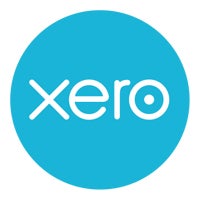
Xero is affordable small-business accounting software. Its simple inventory management module helps you keep track of stock levels to see what’s selling and what’s not. It also integrates with Shopify and more than 40 other e-commerce platforms to support your online business.
With Xero, you can easily track your sales, send invoices and manage your suppliers’ bills, all within the same software. And with pricing plans starting at just $15 a month, it’s attainable for small businesses on a budget.
Pricing
- Early: $15 a month for up to 20 invoices and 5 bills.
- Growing: $42 a month for unlimited invoices and bills.
- Established: $78 per month for additional features like bulk transaction reconciliation and multiple currencies.
Features
- Easy invoice creation tool.
- Expense tracking and claims.
- Bank transaction reconciliation.
- Optional payroll integration with Gusto.
Pros
- Unlimited users on all plans.
- Automatic sales calculations included.
- Many integrations to choose from, including e-commerce platforms.
- Guided set-up process for beginners.
Cons
- Entry-level plan comes with lots of limitations.
- Only one business allowed per account.
- No way to call customer support directly.
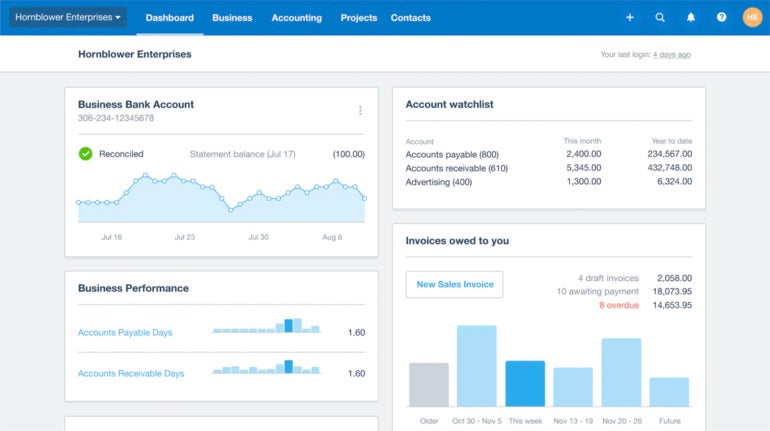
For more information, read the full Xero review and check out our list of Xero alternatives.
QuickBooks Online: Most user-friendly option
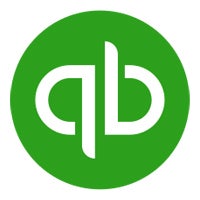
QuickBooks Online is the leading name in accounting software for a reason: It pairs advanced accounting features with plenty of training materials. QuickBooks will automatically bring in transactions from e-commerce software such as Shopify, eBay and Amazon, making it easy to match payouts with bank deposits.
Its robust selection of reports gives you insights into your revenue, expenses and profitability. If you’re able to spring for the Plus or Advanced plans, you’ll also get access to inventory management features.
Pricing
- QuickBooks Simple Start: $30 per month with access for one user.
- QuickBooks Essentials: $60 per month with access for up to three users.
- QuickBooks Plus: $90 per month with access for up to five users.
- QuickBooks Advanced: $200 per month with access for up to 25 users.
Features
- Create unlimited invoices and estimates.
- Track expenses and mileage.
- Organize and manage your bills.
- Accept payments with automatic sales tax.
Pros
- Mobile receipt capture and mileage tracking on all plans.
- Large selection of financial and accounting reports.
- Familiar to accountants everywhere.
- Automate bookkeeping tasks.
Cons
- Users limited on all plans.
- More expensive than some competitors.
- Must upgrade plans to connect multiple sales channels.
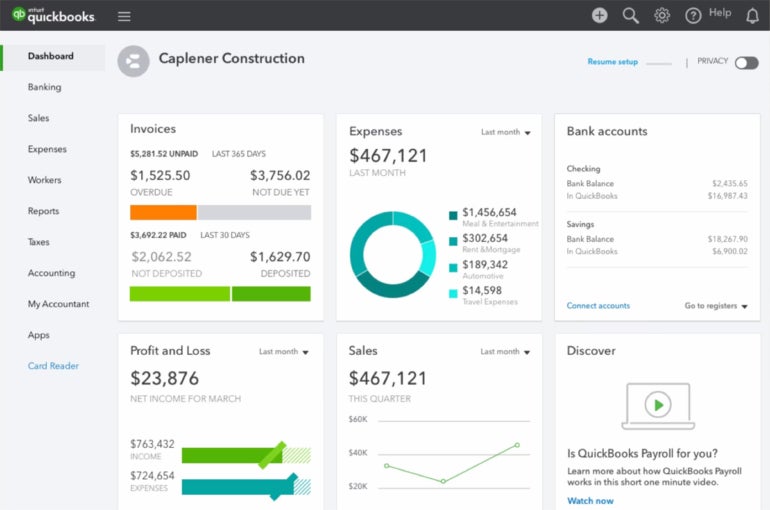
For more information, read the full QuickBooks Online review.
Wave Accounting: Best free solution

Wave is a rare accounting app that offers a forever free plan. The free plan offers unlimited estimates, invoices, bills and bookkeeping records, but you’ll need to upgrade to the paid plan if you want access to other features like automatic bank transaction import and mobile receipt capture. Wave does not directly integrate with any e-commerce platforms, but you can still connect them using Zapier.
Pricing
- Starter: $0 forever for unlimited estimates, invoices, bills and bookkeeping records.
- Pro: $16 a month billed monthly or $170 a year billed annually for automatic bank transaction imports, mobile receipt capture and more.
Features
- Income and expense tracking.
- Simple financial reports.
- Easy-to-navigate interface.
- Wave Payroll integration available.
Pros
- Forever free plan.
- Easy learning curve for beginners.
- Unlimited estimates, invoices, bills and bookkeeping records.
- Manage multiple businesses with one account.
Cons
- Must upgrade to a paid plan for important features.
- Relies on Zapier for integrations.
- No built-in inventory tracking.
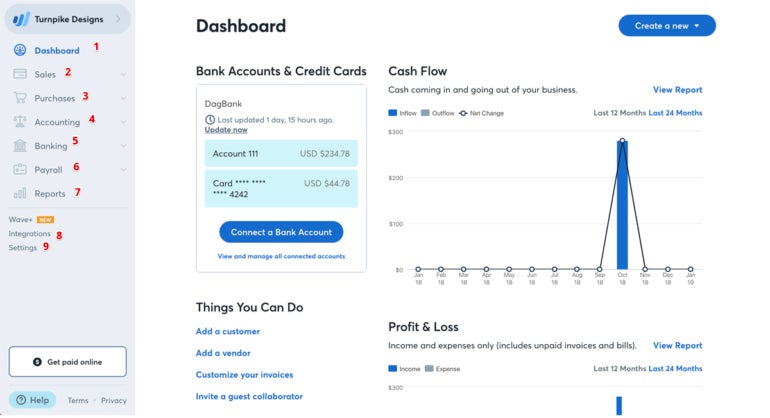
For more information, read the full Wave accounting review and check out our list of Wave accounting competitors.
Zoho Books: Best automations

Zoho Books makes it possible to automate various functions with tools like workflows, webhooks, email alerts and custom functions to save yourself time and effort. It offers six different pricing plans to choose from — including a forever free tier for small businesses — so it’s very scalable for companies of different sizes.
It also seamlessly integrates with other Zoho offerings, such as Zoho Commerce, Zoho Invoices and Zoho Inventory.
Pricing
- Free: $0 for businesses with less than $50K USD revenue per calendar year.
- Standard: $15 per organization per month billed annually, or $20 per organization per month billed monthly.
- Professional: $40 per organization per month billed annually, or $50 per organization per month billed monthly.
- Premium: $60 per organization per month billed annually, or $70 per organization per month billed monthly. A 14-day free trial is available for this plan.
- Elite: $120 per organization per month billed annually, or $150 per organization per month billed monthly.
- Ultimate: $240 per organization per month billed annually, or $275 per organization per month billed monthly.
Zoho Books also offers the following add-ons:
- Additional users: $2.50 per user per month.
- Advanced auto scans: $8 per month for 50 scans per month.
Features
- Set up recurring invoices and expenses.
- Track mileage for reimbursement.
- Manage sales orders and purchase orders.
- Stock tracking and price lists.
- Vendor portal for seamless communication.
Pros
- Forever free plan available for small businesses.
- Lots of different accounting features to choose from.
- Advanced inventory management available on more expensive plans.
- Extend Zoho Books’ capabilities through various other Zoho apps.
Cons
- Charges a small fee for extra users.
- Needs an outside integration for automatic sales tax calculations.
- Must set up free invoicing and inventory add-ons to get full functionality in those areas.
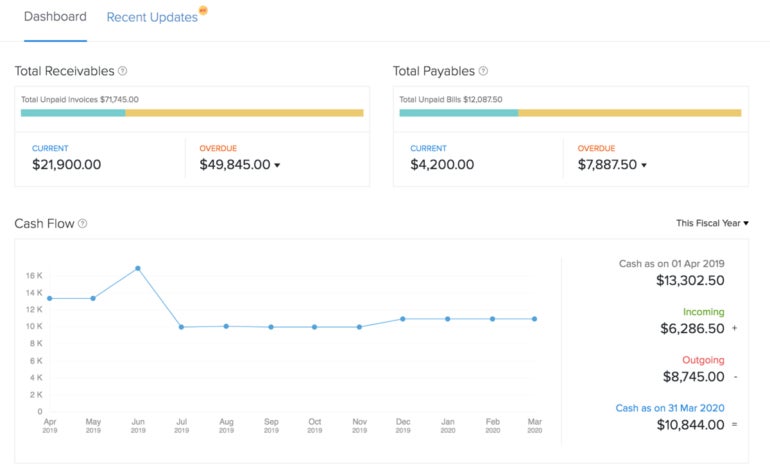
For more information, read the full Zoho Books review.
Sage Intacct: Best for mid-tier businesses

If you run a large e-commerce operation, then you may benefit from Sage Intacct, cloud accounting software that’s designed for more complex operations. It includes not just accounting tools but also payroll and HR software to support a large business with multiple employees.
With Sage Intacct, you can automate accounts payable, accounts receivable, general ledger and more to speed up your accounting work.
Pricing
Sage Intacct does not publicly disclose pricing — you will need to contact the sales team for a custom quote.
Features
- Dashboards and reporting help you gain insights.
- Intelligent general ledger uses AI to scan for anomalies.
- Multi-entity analytics for complex businesses.
- Purchasing and order management.
Pros
- Extremely robust accounting features.
- Designed for large, multi-entity businesses.
- AI and machine learning features help automate work.
- Comprehensive reports to choose from.
Cons
- Pricing is not transparent.
- Learning curve can be steep due to the number of features.
- Too complex for small businesses.
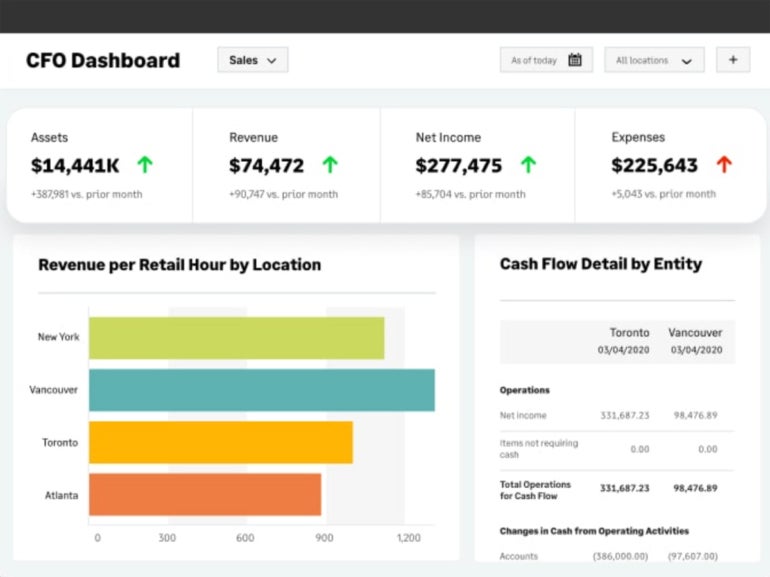
Key features of e-commerce accounting software
Invoice and bill management
The best e-commerce accounting software makes it easy to generate invoices and receipts for your customers’ purchases. It should also allow you to track bills and purchase orders from your suppliers so you can keep tabs on the money going in and out of your business. Many accounting software cap the number of invoices you can create or the bills you can track on the cheaper entry-level plans, so bear that in mind.
Sales tax calculations
Accurate sales tax calculations are essential to keeping your business compliant with all federal, state and local laws. Look for e-commerce accounting software that includes automatic sales tax calculations so that you don’t have to set up workarounds or calculate it manually each time you make a sale.
Inventory management
As an e-commerce business owner, you need to know how much stock you have on hand, down to the very last product. Some e-commerce accounting software have inventory management capabilities built right in, so you can monitor everything within the same system. You should be able to set up the system to automatically alert you when an item goes out of stock or drops below a minimum threshold so you can restock in a timely fashion.
Reporting
E-commerce business owners need both general accounting reports and e-commerce-specific reports to gain a full picture of the financial health of their business. These reports should be easy to customize when it comes to date ranges and data inputs so you can be sure you’re looking at the information you need.
Integrations
When shopping for e-commerce accounting software, you’ll want to make sure that it connects to all your sales channels as well as the other business software apps you use. Not all accounting software platforms connect to all sales channels, so use this criteria to narrow down your search as you make your final selection.
How do I choose the best e-commerce accounting software for my business?
As you narrow down your e-commerce accounting software options, consider the rest of your e-commerce software stack. If the e-commerce software already has certain features, such as inventory management, then it may not be as critical for your accounting software to have that feature as well.
You should also make sure that each accounting software platform integrates with the rest of your software stack. If the accounting software relies on a middleware solution such as Zapier, that may involve extra effort and possibly some extra cost, so be sure to account for that.
We highly recommend taking advantage of free trials as a way to fully test out the software before committing to a free plan. Some software, such as Wave and Zoho Books, even provide a forever free tier of software so you can test out the platform without time limits.
When comparing the prices of various accounting software, remember that some platforms offer an enticing sign-up discount that goes away after the first few weeks or months. Before signing a contract with an e-commerce accounting software platform, make sure the financial commitment will be sustainable for your business over the long haul.
Methodology
To choose the best e-commerce accounting software, we consulted product documentation, demo videos and user reviews. We evaluated products based on pricing, customer service, user interface design and scalability. We also considered features such as invoicing, billing, bank transaction reconciliation, inventory management, sales channel connections and sales tax calculations.

